Don't miss the chance to work with top 1% of developers.
Sign Up Now and Get FREE CTO-level Consultation.
Confused about your business model?
Request a FREE Business Plan.
Top 5 Blockchain Development Platforms to Build Robust Applications
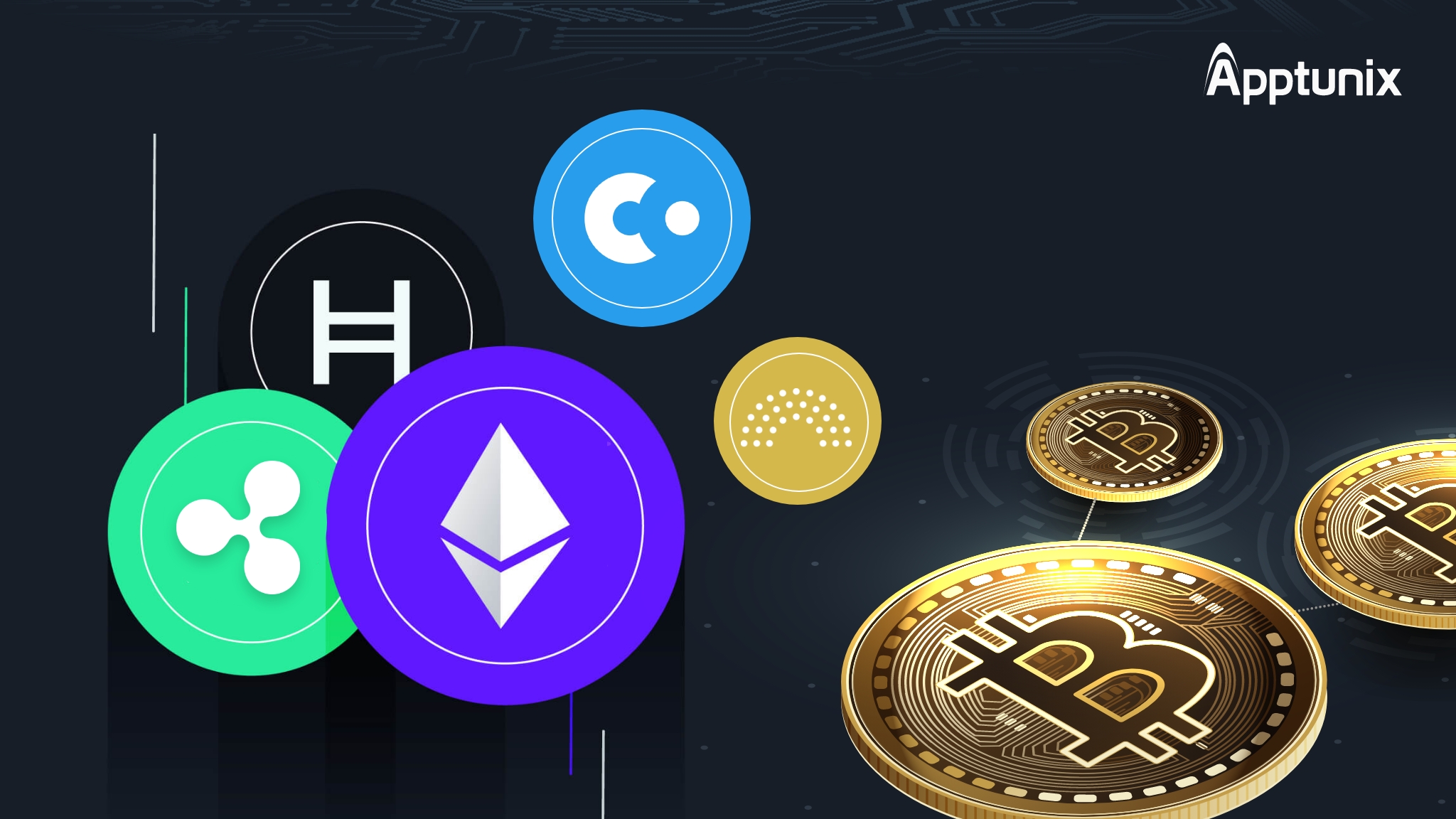
Blockchain as a technology has its uses in nearly all industry verticals. It can be seen that organizations from different domains are embracing blockchain for digital transformation and its applications are going far beyond bitcoin and cryptocurrency.
With its ability to function with transparency while also helping brands save money and time, organizations are investing increasingly in the blockchain technology. From money transfer, healthcare, logistics, and government to the internet of things, personal identity security, media, and NFTs – there are applications of blockchain everywhere.
No doubt why the Global Blockchain Technology Market is expected to grow at a CAGR of 84.5% between 2022 and 2028. It was valued at $1.78 billion in the year 2021. In addition, the world has spent more than $6 billion on blockchain solutions in 2021. And this spending is expected to rise in the coming years.
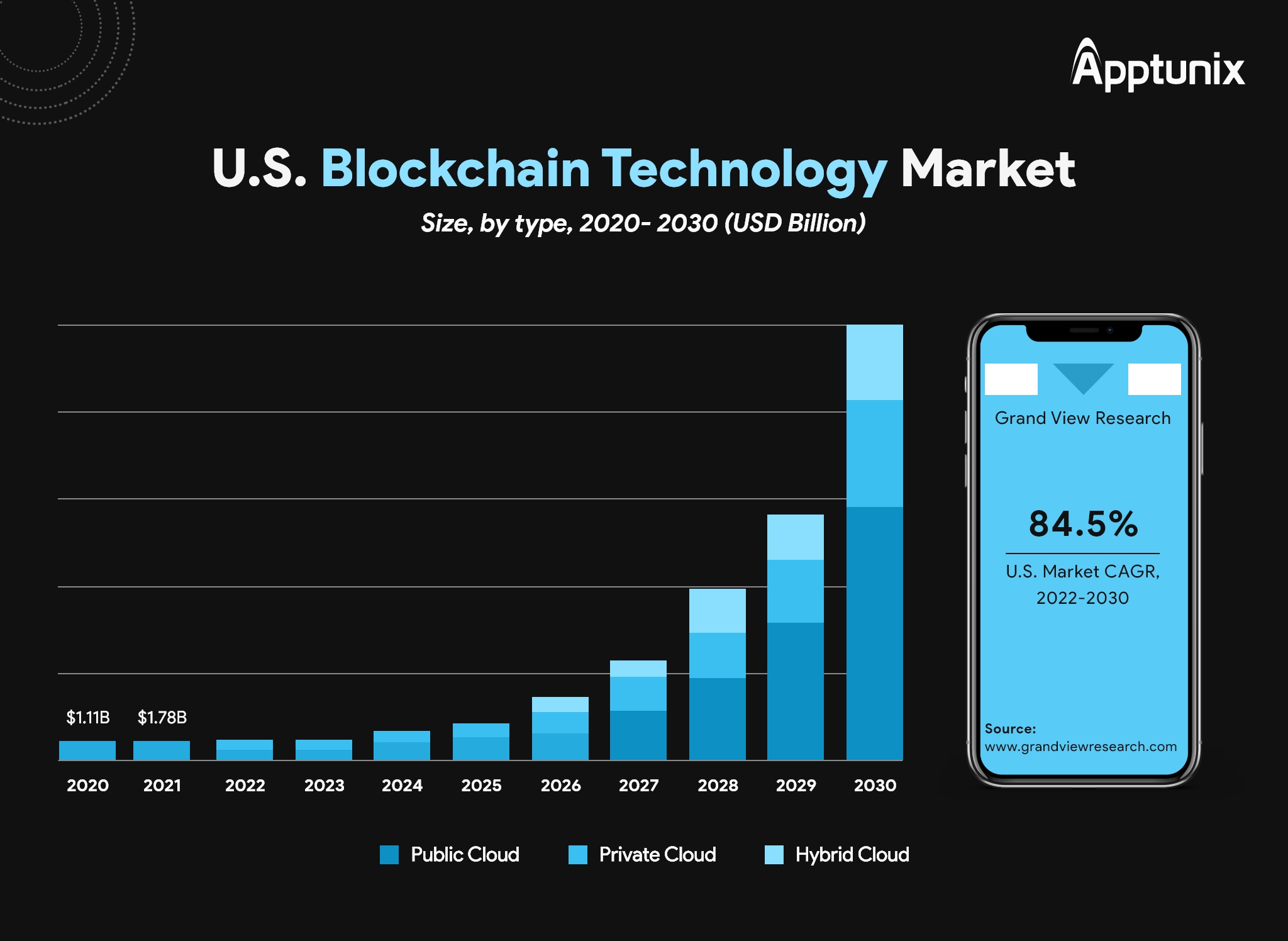
Now, since businesses have started exploring the uses of blockchain, the demand for the blockchain development platforms is also increasing. These platforms permit the development of blockchain-based applications and they can be permissioned or permissionless. Businesses can select the blockchain development platform depending on their needs and preferences.
However, they are often confused while selecting the best ones. So, in this article, we will be discussing some of the top blockchain development platforms along with their pros and cons to make things seamless for them. If you are a business or budding entrepreneur who wants to utilize Blockchain Technology for your business app, read on.
5 Best Blockchain Platforms to Consider in 2022 and 2023
Blockchain platforms let developers build blockchain-based apps easily and efficiently. However, you need to choose the right one depending on your business needs. Let’s check out some of the best ones:
1. Ethereum

Ethereum is one of the top blockchain development platforms in terms of usability and popularity. It came into existence in 2013 and is gaining immense popularity with every passing day. This platform supports smart contracts and DApps and is known for the smoothness and scalability that it provides to even a huge scale of data transportation.
Being one of the oldest and most established blockchain platforms, it even has its own cryptocurrency called ETH or Ether. It uses PoW (Proof-of-work) mechanism and is the top choice of NFT traders. It is a permissionless blockchain platform and developers who need to develop apps using Ethereum have to pay charges in Ethers for running transactions.
Here are some of the use cases of Ethereum:
- It enables the creation of smart contracts and assets
- Best for enterprise-level apps that require scalability, security, and transparency in transactions
- NFTs are also compatible with anything that is developed on the Ethereum platform. They are useful in giving digital value to art, gaming, music, etc.
- Along with gaming, it can also be used for several innovative apps in advertising, finance, supply chain management, healthcare, etc.
2. Hyperledger Fabric
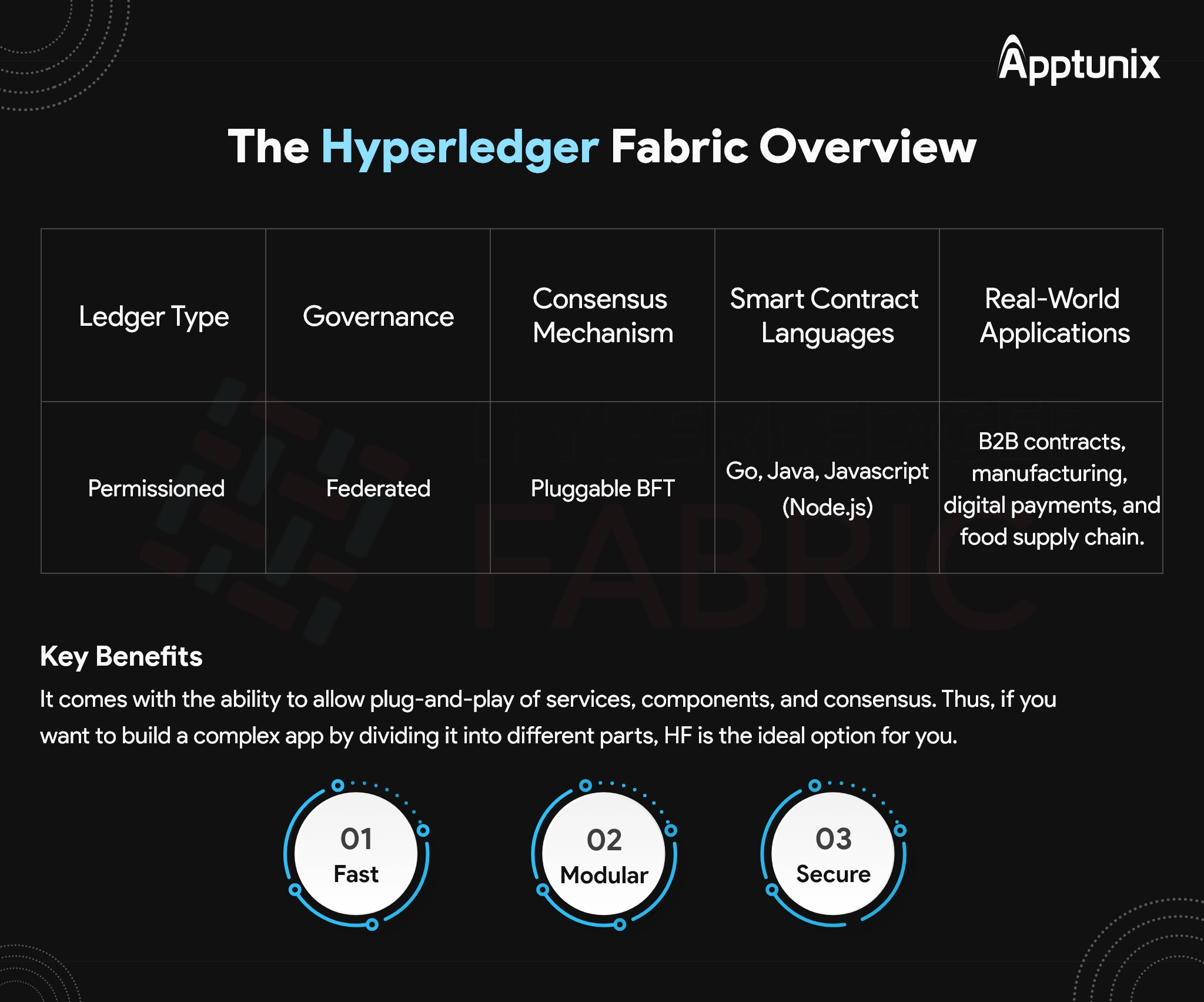
The second in our list of best blockchain development platforms is Hyperledger Fabric. It helps build blockchain-based apps or solutions using a modular architecture. It gives network designers the flexibility to plug and play with the components they require. Thus, if you need to build a complex application or software that needs flexibility, Hyperledger Fabric is the ideal option for you.
It is a blockchain platform that supports software where privacy – through channels – is a crucial operating requirement. It can isolate several transactions in the channels fast. Many blockchains prefer creating enterprise-grade solutions using this platform. Governed by Linux Foundation, Hyperledger Fabric’s absence of a proof-of-work algorithm provides high scalability.
Here are some of the use cases of Hyperledger Fabric:
- One of the most popular use cases of Fabric is in supply chain management. It can help businesses track their products from pickup to delivery at the customers’ doorstep
- You can also use Fabric where you need to manage or store a lot of highly confidential data
- It can also be used in trade and finance. You can apply it in domains where all operations and record-keeping transactions can be recorded which helps avoid fraud
- The IoT can also be further improved with Fabric. To connect devices, you will need a strong and secure network that functions well to help devices stay connected with each other. IoT and Blockchain can provide a good arrangement to support all of this.
Also Read: Golang Programming: What All Can You Do Using “Go” By Google?
3. RippleNet
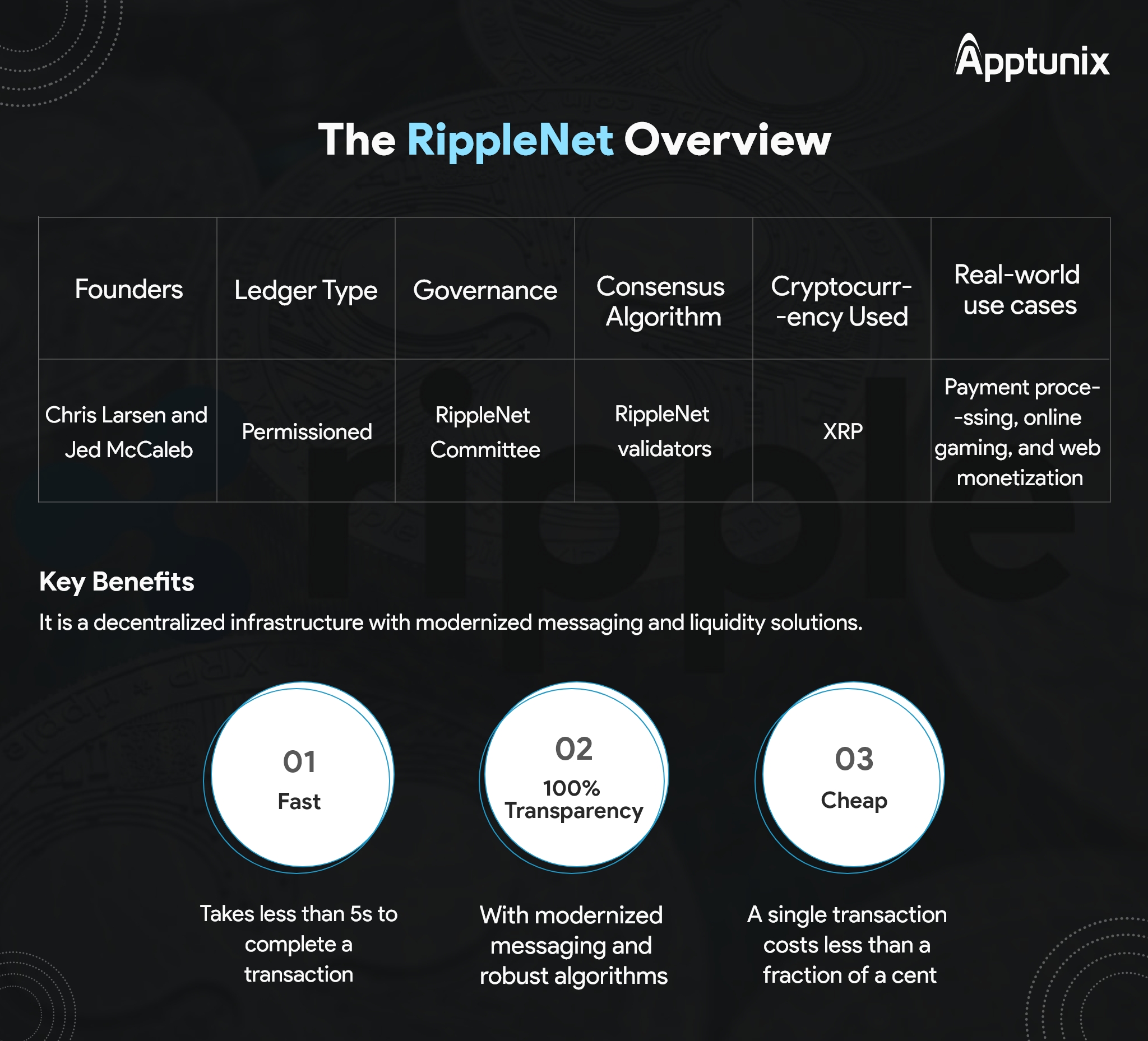
Launched in 2012, Ripple is an open-source protocol developed to support transactions in a cheap and fast way. It is not just a platform but also a currency. The platform’s own currency is called XRP and it also lets businesses create their own currency with the help of RippleNet.
The mission of RippleNet is to allow banks to process cross-border transactions in a less costly and quick manner. Thus, it is an ideal option for the present global payment system used by most banks. The platform offers numerous benefits for people who make international transactions, for example, a typical transaction takes less than five seconds to complete via RippleNet.
Here are some of the use cases of Ripple:
- Developers are leveraging XRP Ledger to develop creative software and products for gaming, web monetization, and content where the currency is the main part
- You can use the Ledger to create digital wallets to store public and private passwords and interact with other blockchains to receive and send digital assets
- Businesses can develop robust finance applications on Ripple. The platform can also be used to send receipts, invoices, and other types of digital documents
- Many companies use it as a global currency account for transacting with and storing global currencies
You can build high-level exchanges where customers can trade and invest crypto and non-blockchain assets like ETFs, stocks, and commodities.
4. Corda
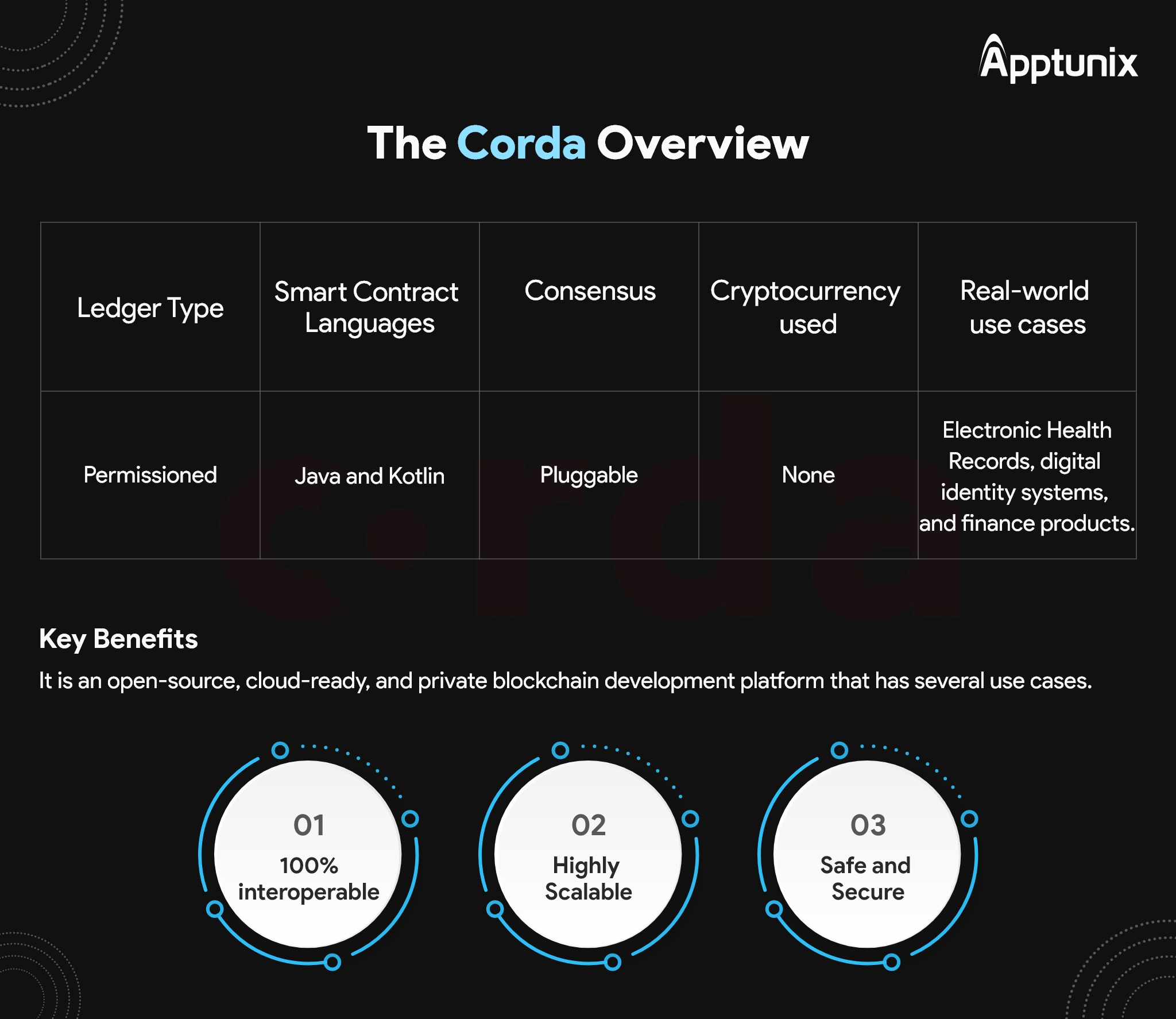
Launched in 2015, Corda is another open-source blockchain development platform by the R3 Consortium. It was initially developed for financial institutions but it has now expanded into the insurance, healthcare, and finance industry as well.
Corda is a permissioned P2P DLT (Distributed Ledger Technology) that supports the smart contact feature. It means businesses can program and deploy smart contracts on the platform using Java or Kotlin. In addition, there are no tokens or cryptocurrencies in Corda.
The platform has proven performance backing it up and it can handle more than 600 transactions per second. In addition, it is highly scalable and can process and store data using a ledger. One of its main advantages is its Serialization Framework which consists of a set of APIs leveraged to boost and standardize interoperability in several components of the platform.
Here are some of the use cases of R3’s Corda:
- Corda can be used to solve one of the biggest challenges facing the healthcare industry today, fragmentation of the store services and data, which leads to poor patient care and increased fraud
- In the finance sector, businesses can create a funnel to safeguard customer data and support fast transactions with the help of Corda
- You can manage digital assets well in Corda. It provides 100% security, scalability, and reliable control.
5. Quorum

Basically, Quorum is an enhanced version of Ethereum founded by J.P Morgan. It is just a modification of Ethereum’s main features and that’s why it incorporates Ethereum updates quickly and flawlessly.
Just like Ethereum, Quorum is also free to use and an open-source blockchain platform. But, it uses vote-based and several other different algorithms to process more than 150 transaction requests per second. Because it is a permissioned platform, the networks using Quorum will not be open to everyone. It can manage software and apps needing speed of private transactions and high throughput processing.
Here are some of the use cases of Quorum:
- Use cases of Quorum blockchain in finance and banking include applications like tokenized cash, supply chain finance, trade finance, and capital market data.
- Another example of using Quorum blockchain is in the healthcare industry. Synaptic Healthcare Alliance is a pilot blockchain project that focuses on creating an industry-wide database for healthcare providers using Quorum.
- Other use cases can be seen in the supply chain, governance, and public sectors.

How to Choose an Ideal Blockchain Development Platform for Your Business?
The above-mentioned blockchain platforms are all top-notch and have amazing capabilities. However, choosing the one among them that suits your business needs in the best possible manner is the most difficult task. It needs a lot of research and experiments. Here are some of the factors that you should consider:
- The type of blockchain you need: First of all, you should decide whether you need a private or public blockchain. Using public blockchain, you can reach a wide audience while private blockchain platforms are ideal options if you need top-notch security. There are
- Scalability: As your blockchain application grows (in terms of transactions and customers), the platform you use must be able to adapt to this scenario. Blockchain projects often face scaling issues. Thus, you need to choose a platform carefully that fulfills your future needs in the best possible manner. For example, Ripple provides better transaction speed as compared to Bitcoin and Ethereum. So, if speed is your preference, you should go with Ripple.
- Languages: Which language your platform supports matters a lot. For example, if you have developers who have expertise in Kotlin or Java, you should choose Corda. Or, if you are in the IoT industry, it is recommended to select platforms that support machine-to-machine communications and DLT (Digital Ledger Technologies).
- Popularity: This is also an important factor because the more popular a platform is, the more developers you will be able to find. Also, community support matters a lot so that you are never stuck in a situation that has no way out.
Also Read: An Entrepreneur’s Guide to Starting a Financial Technology Company
Wrapping Up
To develop a robust blockchain application, you should choose a platform that can fulfill your present and future business needs.
While Corda, Fabric, and Ethereum are the most popularly known blockchain development platforms, your team of blockchain app developers must also have an understanding of languages like Python, C++, Solidity, and how distributed storage like RDBMS and NoSQL work to develop a robust app.
So, do your research and compare all the above-mentioned platforms against these factors to make an informed business decision. You can always get in touch with Top-Notch Blockchain Software Development at Apptunix to help you make the right decision.

Rate this article!
(1 ratings, average: 5.00 out of 5)
Join 60,000+ Subscribers
Get the weekly updates on the newest brand stories, business models and technology right in your inbox.

Nikhil Bansal is the Founder and CEO of Apptunix, a leading Software Development Company helping startups as well as brands in streamlining their business processes with intuitive and powerful mobile apps. After working in the iOS app development industry for more than 10 years, he is now well-equipped with excellent problem-solving and decision-making techniques.

Telemedicine 2.0 - A Comprehensive Guide On What Healthcare Providers Need To Know?
Discover how the latest advancements like Artificial Intelligence in telemedicine are reshaping patient care. This comprehensive resource offers insights into the key trends and innovations driving this shift, providing valuable knowledge for healthcare professionals looking to stay ahead.
Download Now!Don't Know Much
About Technology?
Let our experts help you decide the right tech stack for your idea.


















